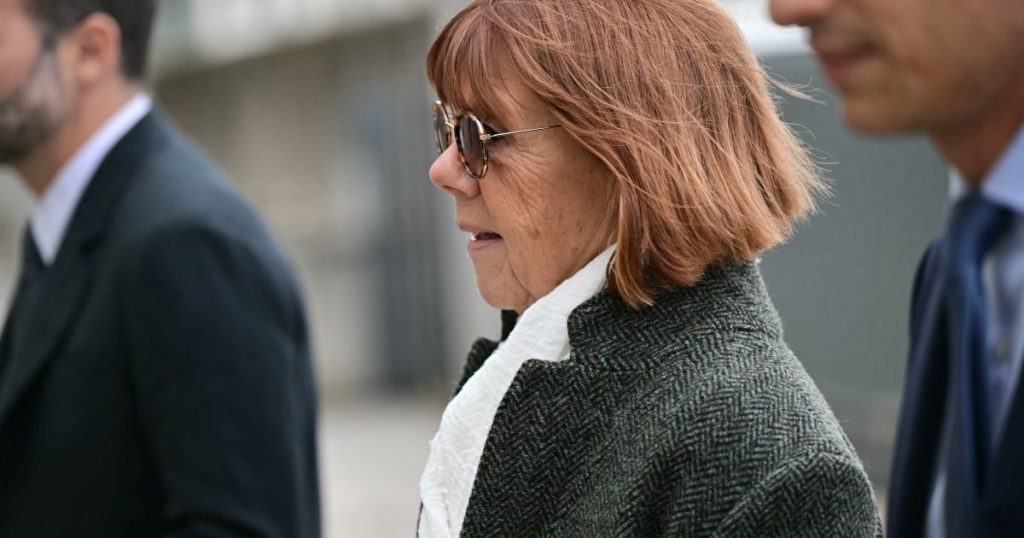A French court has recently made a significant ruling in the trial of Dominique Pelicot, a man accused of orchestrating the rapes of his heavily drugged ex-wife, Gisele Pelicot, by multiple strangers. Initially, the court had decided to exclude the public from witnessing the presentation of video evidence, citing the indecent and shocking nature of the content. However, during a session on Friday, Judge Roger Arata announced that the public could indeed be present for the screening of these videos, but only in strictly necessary circumstances when requested by one of the parties involved. This decision marked a reversal from an earlier ruling that aimed to restrict public access to such sensitive material.
The trial, which commenced on September 2 at the Avignon court, has been characterized by intense media coverage and has attracted significant attention due to the gruesome nature of the allegations. Victim Gisele Pelicot’s legal team lauded the change in ruling as a hard-won victory, emphasizing the importance of keeping the trial proceedings public to raise awareness about the issues of drug-facilitated sexual abuse. Before this ruling, the courtroom had been reserved solely for legal representatives, court members, and the press, while the public was relegated to an adjoining room where live streams of the proceedings were being shown.
Dominique Pelicot’s own actions played a crucial role in bringing the abuses to light; he filmed much of the horrific acts committed against Gisele and kept detailed records of individuals who visited their home. This documentation unwittingly revealed the extent of the crimes, leading to a deeper investigation into the incidents. The case initially gained traction in 2020 after Pelicot was apprehended for taking inappropriate pictures of women in a supermarket, which eventually escalated to the more serious charges he now faces. Confusion and contention arose during the trial because lawyers for the defense opposed the screening of video evidence, arguing that it was unnecessary for the pursuit of justice and only served to sensationalize the proceedings.
The ruling allowing video evidence to be screened in a public setting was met with mixed reactions. Lawyer Stephane Babonneau representing Gisele suggested that while the decision grants a level of recognition to the victim’s plight, it underscores a larger systemic issue in how such cases are treated. He pointed out that victims of rape have had the right to choose the public nature of their trials for over four decades in France. Gisele’s bravery in sharing her traumatic experience has positioned her as a feminist symbol, although her legal team argues that this publicity should ideally serve a greater purpose – deterring similar acts against vulnerable women.
As the trial unfolds, it continues to attract attention not only for its explicit nature but also for the broader implications for societal attitudes toward sexual violence. Currently, forty-nine other men are charged as accomplices in the rapes, with another admitting to drugging his spouse to facilitate the assault. The complexities of each case and the legal arguments presented by the defense reflect a tension between the need for public accountability and the rights of the accused. Some defense lawyers have strongly condemned the decision to allow public screenings, suggesting that focusing on shocking evidence could undermine a fair trial, and voicing concern about transforming a legitimate judicial process into a spectacle for the public.
In response, proponents of allowing the evidence to be public argue that it is crucial for exposing the systemic issues surrounding rape culture and women’s rights, emphasizing that the recorded evidence illustrates the predatory nature of the offenses committed. They argue that these videos dismantle any claims that suggest the rapes were accidental and highlight the pervasive misogyny displayed by the defendants. The trial is expected to continue until December, with emotional testimony and evidence drawing further scrutiny to the actions of Dominique Pelicot and his alleged accomplices. The ongoing discourse surrounding this landmark case ultimately seeks to shine a light on the critical need to advocate for and protect victims of sexual violence, as well as to foster an informed societal response to such heinous acts.


